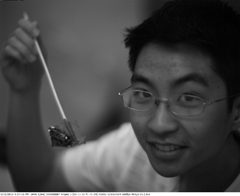Yung-En Perng Rose Hills
Hexapodal Robustness: the effects of leg loss on energetic and kinematic performance in Blaberus discoidalis cockroaches
My project examines an aspect of the robustness of the hexapodal design. Cockroaches are one of the fastest terrestrial animals for their size and mass, and have been shown to negotiate many different types of externally caused perturbances, such as uneven or slippery terrain. Previous research suggests that cockroaches use passive mechanical control, which is built into the physical properties of the locomotory system, to overcome uneven terrain (Sponberg and Full, 2008). But how about a perturbance brought about by altering the cockroach itselfleg loss? I seek to determine whether these animals spend more energy for running the same distance, and whether they can run just as fast with fewer than six legs. By observing changes in gait and step frequency, I may be able to understand how these hexapodal runners compensate for leg loss. A biomechanical discovery can help explain their ancient evolutionary history and also provide inspiration for search-and-rescue robot design.
Message To Sponsor
The SURF/Rose Hills grant has enabled me to work full-time this summer to find out whether a research career is the right fit for me. I love science and sharing the excitement of new discoveries, so I want to test out this line of work full-time. In the future, I hope to either attend graduate in human biomechanics and/or study physical therapy. Doing research in animal biomechanics and studying physical and theoretical models has enhanced my ability to understand concepts in other classes related to human biomechanics. SURF funding is making the synergy between undergraduate research and coursework possible for me.